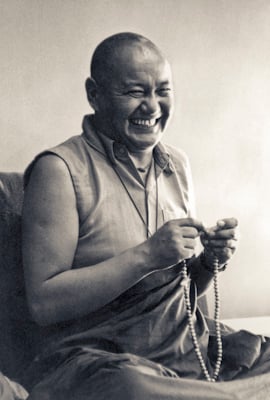Samsara:
Cyclic existence; the six realms of conditioned existence, three lower—hell, hungry ghost, and animal—and three upper—human, demigod, and god.
The beginning-less, recurring cycle of death and rebirth under the control of delusion and karma, fraught with suffering.
Also refers to the contaminated aggregates of a sentient being.
- See more at: http://www.lamayeshe.com/index.php?sect=static&subsect=glossary#s

Thubten Yeshe
Yeshe, Lama (1935–1984)
Born and educated in Tibet, he fled to India, where he met his chief disciple, Lama Zopa Rinpoche.
They began teaching Westerners at Kopan Monastery in 1969 and founded the Foundation for the Preservation of the Mahayana Tradition (FPMT) in 1975.
- See more at: http://www.lamayeshe.com/index.php?sect=static&subsect=glossary#yeshe, lama (1935–1984)
Source: http://www.lamayeshe.com/index.php?sect=article&id=880
Samsara in Buddhism: Saṃsāra or Sangsāra (Sanskrit)
Main article: Saṃsāra (Buddhism)
Within Buddhism, samsara is defined as the continual repetitive cycle of birth, death, and intermediate bardo state that arises from ordinary beings' generating and fixating on a mistaken concept of self and experiences.
Within Buddhism, samsara is defined as the continual repetitive cycle of birth, death, and intermediate bardo state that arises from ordinary beings' generating and fixating on a mistaken concept of self and experiences.
Samsara arises out of wrong knowledge about reality (avidya) and is characterized by dukkha (failure, suffering, anxiety, dissatisfaction).
In the Buddhist view, liberation from samsara is possible by following the Buddhist path.
Generally, there are six realms of samsara. These include: Gods, Asuras, Hungry Ghosts, Hell Beings, Animals and Humans.
Etymology and origin
Saṃsāra is a Sanskrit word, the literal meaning of which is "a wandering through" – in reference to the passage through many states of existence that is involved in the endless cycle of death and rebirth.
The historical origins of a concept of a cycle of repeated reincarnation are obscure but the idea appears frequently in religious and philosophical texts in both India and ancient Greece during the middle of the first millennium B.C.E.
Generally, there are six realms of samsara. These include: Gods, Asuras, Hungry Ghosts, Hell Beings, Animals and Humans.
Etymology and origin
Saṃsāra is a Sanskrit word, the literal meaning of which is "a wandering through" – in reference to the passage through many states of existence that is involved in the endless cycle of death and rebirth.
The historical origins of a concept of a cycle of repeated reincarnation are obscure but the idea appears frequently in religious and philosophical texts in both India and ancient Greece during the middle of the first millennium B.C.E.
Orphism, Platonism, Jainism and Buddhism all discuss the transmigration of beings from one life to another.
The concept of reincarnation is present in the early Vedic texts such as the Rig Veda but some scholars speculate it to have originated from the Shramana traditions.
Several scholars believe that reincarnation was adopted from this religious culture by Brahmin orthodoxy, and Brahmins first wrote down scriptures containing these ideas in the early (Aitereya) Upanishads.
No comments:
Post a Comment